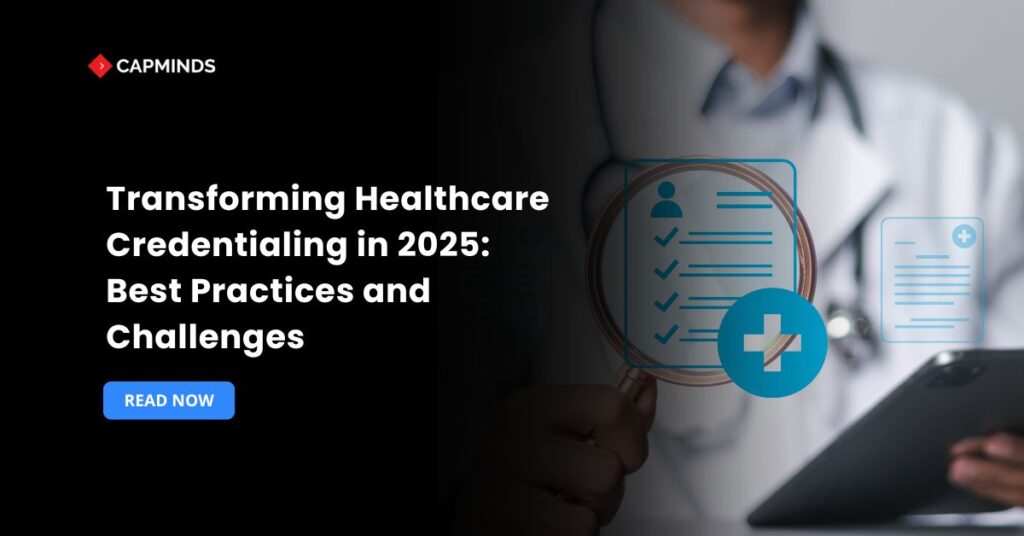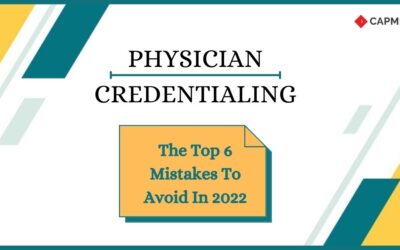Transforming Healthcare Credentialing in 2025: Best Practices and Challenges
The healthcare sector is driven by technology breakthroughs, shifting regulations, and a growing desire for patient safety; the credentialing process has never been more important. This blog will cover all you need to know about healthcare credentialing, including what it is, why it matters, the types, challenges, and benefits of a strong credentialing program.
What is Healthcare Credentialing?
Healthcare credentialing is the process of confirming and evaluating healthcare practitioners’ credentials to make sure they fulfill the requirements. Patient safety, treatment quality, and compliance in medical institutions and insurance networks all depend on this procedure.
Core Objectives of Healthcare Credentialing
- Check the identity and confirm that the person claiming a certain title or license genuinely owns it.
- Verify the educational background that the practitioner has completed authorized programs and residencies.
- Validate that any state or national licenses and specialist certificates are current and in good standing.
- Examine previous job experience, disciplinary proceedings, malpractice history, and peer references.
- Organizations may reduce risks, increase patient safety, and ensure regulatory compliance by properly assessing credentials.
Uses of Healthcare Credentialing
1. Patient Safety and Quality of Care
Underqualified or unverified professionals are at risk for incorrect diagnoses, medical errors, and negative outcomes. As a gatekeeper, credentialing makes sure that only those with proven experience administer care.
2. Adherence to Regulations
Current certifications are required by payers and accrediting agencies like The Joint Commission and NCQA. Noncompliance may result in fines, loss of accreditation, or exclusion from insurance networks.
3. Insurance and Reimbursement
Insurers typically enroll providers in their networks only after they have been credentialed. This procedure sets reimbursement rates, participation status, and eligibility for value-based payment models.
Related: 5 Ways Salesforce Health Cloud Streamlines Provider Credentialing & Contracting
Types of Healthcare Credentialing
1. Primary Source Verification
Direct validation of credentials like licenses, certificates, and degrees from the granting entity, such as state medical boards, educational institutions.
- Automated data sharing with certifying authorities
- Real-time license status checks.
- Removes dependency on self-attestation.
2. Provider Enrollment and Network Credentialing
The process of applying to join an insurer’s or health plan’s network to offer reimbursable services.
- Completion of payer-specific apps like CAQH ProView and proprietary portals.
- Negotiation of contract conditions and fee schedules.
- Verification of malpractice coverage limitations.
3. Privileging and Scope of Practice
Providing particular clinical privileges within a hospital or health system based on established competency.
- Departmental peer review, case records, proctor assessments, and continuous performance metrics.
- Defined re-prioritization periods are usually every 2 years.
4. Continuing Education and Maintaining Certification
Tracking needed continuing medical education hours and participating in maintenance of certification programs.
- Integration of CME activity databases
- Automatic reminders of renewal deadlines.
- Portfolio tracking for board certification.
5. Telehealth and Interstate Credentialing
Streamlined credentialing for clinicians who offer treatment across state boundaries or through telemedicine platforms.
- Use of interstate compacts such as IMLC for physicians and NLC for nurses.
- Single-state license recognition, virtual site visits, and remote identity verification.
Advantages of Healthcare Credentialing
- Enhanced Patient Safety – Consistent PSV and monitoring of practitioner performance limit the possibility of mistakes and adverse consequences.
- Payor and Regulatory Compliance – Automated tracking and warnings guarantee that companies never miss important renewal deadlines, protecting accreditation and network participation.
- Operational Efficiency and Cost Savings – Digital credentialing technologies eliminate manual work, minimize onboarding periods from months to weeks or days, and reduce the cost per credentialing case.
- Improved Provider Experience – Self-service portals and CAQH integration enable providers to maintain their profiles, eliminating recurring data requests.
- Data-driven Insights – Analytics on volume trends, rejection rates, and credentialing cycle lengths enable ongoing resource allocation and process improvement.
- Scalability of Modern Care Models – As healthcare organizations grow their corporate networks, telehealth, and multispecialty clinics, centralized credentialing systems offer the flexibility and scalability needed to quickly add providers.
Challenges of Healthcare Credentialing
- Data Fragmentation – Credentials are kept across several sources, including state boards, professional associations, and insurance, making aggregate and PSV time-consuming.
- Manual Workflows – Many firms continue to use paper forms, faxes, and email, resulting in delays, transcription mistakes, and lost papers.
- Verification delays – Some sources, particularly older academic institutions, lack digital APIs, resulting in longer response times.
- Regulatory Complexity – Variations in regulations among states, specializations, and payers impede process standardization and raise administrative costs.
- Cybersecurity and Data Privacy – Managing sensitive personal and professional data requires strong security measures, HIPAA compliance, and risk mitigation for data breaches.
Healthcare Credentialing Best Practices for 2025
- Unified Credentialing Platforms are comprehensive systems that combine PSV, enrollment, privilege, and re-credentialing into a one workflow.
- Follow FHIR-based credentialing profiles and CAQH CORE standards for automated data sharing.
- Artificial intelligence is used to identify expired licenses, detect incomplete applications, and even forecast credentialing bottlenecks, while robotic process automation is used to fill up repetitive forms.
- Continuous monitoring uses real-time data from penalty lists, malpractice trackers, and state boards to detect unfavorable occurrences or disciplinary proceedings.
- Establishing governance committees composed of members from compliance, clinical leadership, IT, and human resources to speed policy changes and resolve exceptions.
- Regular platform training, clear explanation of requirements, and feedback loops to improve credentialing operations.
Related: 7 Essential Stages in the Provider Credentialing Process You Need to Know
Streamline Credentialing with CapMinds: Powering Patient Safety & Compliance
As healthcare grows more complex, credentialing must evolve to keep up with emerging care models, regulatory demands, and patient safety standards.
At CapMinds, we help healthcare organizations modernize and automate their entire credentialing lifecycle with future-ready digital health solutions.
With CapMinds Credentialing Services, you get:
- Unified Credentialing Platforms that integrate PSV, privileging, and re-credentialing workflows
- Telehealth & Multi-state Support with streamlined provider onboarding across state lines
- Automated License & Certification Tracking using AI & real-time data feeds
- Payor Enrollment Services to accelerate participation in insurance networks
- Data Security & HIPAA Compliance to protect sensitive provider information
- Analytics Dashboards for cycle time insights, performance trends, and bottleneck prediction
Partner with CapMinds to transform your credentialing process and ensure safer, smarter care.



